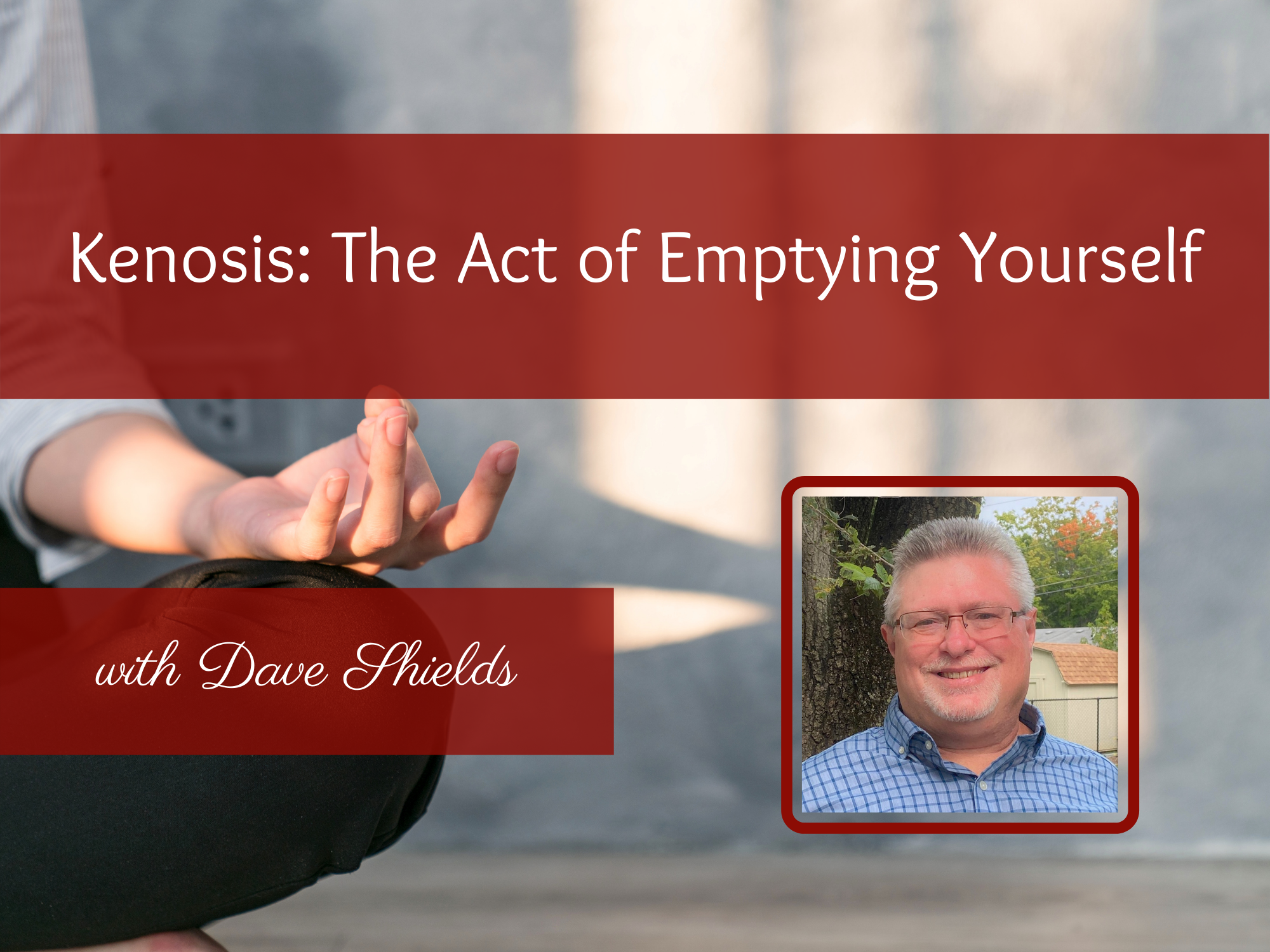While attending a conference in San Francisco in the late 1990’s, Dave Shields read a book that changed the course of his career, and his life. Out of The Spirituality of Imperfection by Ernest Kurtz and Katherine Ketcham, the name and concept for Kenosis Counseling Center was born.
Dave was particularly drawn to the idea of kenosis, which is ancient Greek for “emptying out.” He fell in love with the idea and knew that’s what he wanted to call his long-planned private practice. His wife, Christine, who now runs the practice with him, was supportive of the idea from the beginning.
And so it began: in a remodeled garage, he saw his first clients.
We interviewed Dave, founder of Kenosis, about who Kenosis Counseling Center is, what the mantra “Empty Yourself. Change Your Life. Fill Your Future” is all about, and the significance of emptying yourself in the healing process.

Who is Kenosis Counseling Center?
Here at Kenosis, the mantra is: Empty Yourself. Change Your Life. Fill Your Future. Although it wasn’t always defined that way, it’s the framework Dave has been using since the early days of Kenosis.
As an undergrad, Dave knew he wanted to start a private practice – much to the shock of his advisor, who warned him he couldn’t do that with a bachelor’s degree. After finishing his master’s degree and becoming a stay at home dad, his passion to begin his own counseling practice was still alive.
And so he did! Dave says, “We remodeled half of the garage into a really nice office with a waiting room and bathroom, and I started my private practice.”
A few years later, when he had a client base, the practice underwent some branding and business development. That’s where “Empty Yourself. Change Your Life. Fill Your Future.” was born. Dave notes that the mantra was “what we were already doing with clients, and our clients were able to express that back to us through our survey.”
Although Dave and Christine had ideas about where they would like the practice to go, the clients and their transformations inspired the mantra. “We learned from them what we were already doing, and it felt right to us that we continue to do so,” Dave recalls.
Since around 2004, Kenosis’ focus on emptying yourself, changing your life, and filling your future has altered the course of countless lives. While many counseling centers offer life transformations, Kenosis is unique in its desire to continue the growth process after therapy and/or treatment has been completed. Dave explains, “We feel like we’ve been able to bring clients in and help them really expel mental health symptoms that they were experiencing and to reclaim a good life.”
This reclaiming process starts with kenosis: emptying oneself so you have space to change your life and fill your future.

What Does it Mean to “Empty Yourself”?
For Dave, emptying yourself isn’t just a process at Kenosis, it’s personal.
He explains, “I grew up in poverty, so I had a scarcity mindset. I was always afraid that there wouldn’t be enough to go around. I had to attend to that scarcity mindset, honor it, and realize that it drove me in my levels of perfection.” While scarcity mindset had helped him become successful, it stopped him from thriving to the extent he knew was possible.
Then, in 2011, he was diagnosed with endogenous depression. “It started with Major Depression and progressed to Catatonic Depression. I came out of that starting in late 2019. I had been on disability. By then I’d retired my license to practice and been all over the country looking for cures and solutions with top depression doctors and treatment centers.”
It was time to empty himself so that he could move forward.
During therapy, Dave experienced kenosis for himself: “As I talked about some of those stories, processed through some of those experiences, and looked at some of the character traits I had developed to survive, I saw they weren’t necessarily the character traits that I needed to thrive.”
Through that experience of kenosis, Dave was able to begin his road to recovery. Since he’s been able to empty those negative experiences, he gained a respect for the experiences that shaped him. “I have tremendous respect and affection for how I grew up, even though it was very hard. I learned some life skills based on them that I’ll always have with me. I’ve emptied out some of those negative experiences that had a negative impact on me,” he recalls.
He knew he couldn’t thrive with these negative experiences lingering in his life, so he learned, through counseling, to adopt “more of a bountiful strategy, a blessing strategy, and a faith that if I bring value to the world, abundance will follow.”
Kenosis Counseling Center makes stories like Dave’s a possibility for many who might not have seen a solution before. Not everyone comes to counseling ready to face their experiences, though. Dave says, “Sometimes folks don’t value the past and so I like to invite them to tell their story in a way where we can empty out from the negativity of that story, and then bring up the value to be able to adopt a new perspective on some of the life skills you may have learned through bad experiences.”
It’s through this emptying process that you can really begin to see changes in your life. “Our clients each come with their own unique set of baggage, beliefs, mindsets, character traits, experiences, and family of origin relationships. And each of those folks needs to be able to experience kenosis in order to be new again, to refresh, to get focused on their vision for the future, and to be able to have better lives,” explains Dave.

What is the Significance of “Emptying Yourself”?
As Dave says, “Many times, in order to grow and become new again, we have to be able to let go.” Being willing to empty yourself is a sign of growth and positive change in our lives.
Kenosis doesn’t look the same for everyone, though. “Somebody’s story has a lot to do with their ability to experience kenosis. Everybody’s story is unique, and we have to honor the story that we come in the door with in order to be able to write the next chapter,” Dave notes. Emptying yourself is about acknowledging what has been, accepting what is, and being able to move forward in a way that reflects the life you want to live.
Taking the steps to get help and beginning the process of kenosis is brave. Dave emphasizes, “Emptying yourself takes tremendous courage.” Even taking the first step of looking for help is a courageous act: “Seeking a mentor or a therapist or a coach is an example of courage – not weakness – even though it’s taboo.” Not only do you have to feel safe with someone, but you have to develop trust and rapport, which can be intimidating at first..
When you develop this relationship with a counselor, you’ll be willing to “go to places that you wouldn’t ordinarily go with a friend or a family member.” Dave calls this “sacred space.”
Creating sacred space is what therapists do. “That’s the job of the therapist: to create a sacred space of acceptance, and to be non judgmental and loving in the presence of somebody’s worst character traits,” Dave notes.
Ultimately, emptying yourself is just the beginning. As the first of three parts of Kenosis’ mantra, emptying yourself is very important for the healing process. It’s only after you empty yourself that you’ll be able to change your life and fill your future with your dreams and aspirations.
Dave’s goal is to change lives. He says of his clients, “I want for them to have a fully transformative experience. Emptying out is a fantastic gift to experience all by itself, but it’s not the end.”
Dave’s dream of owning a private practice was born when he was a college student working on a social work degree. The path through his education, and his experiences with his own endogenous depression diagnosis and subsequent treatment, illustrated to him the importance of being able to empty yourself in order to move forward. He recalls, “I had a lot of character traits, family history, and experiences that I needed to let go of so I could grow personally and professionally.”
If you’re considering counseling, or know that you need help but are still unsure, you’re not alone. It takes courage to recognize that you need help, and bravery to take that first step in finding a counseling center. Take heart and know that we’re here when you’re ready to begin changing your life.

